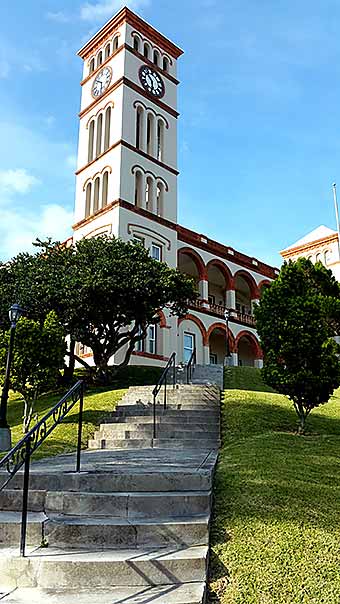05
Nov
2014
Bermuda’s new funds regime receiving international recognition

19:06 /
Company & Commercial Law




 In December 2012, I wrote an article on the case of Farnworth v R [2012] Bda LR 44 (151 KB PDF). This particular case provided guidance on the definition of a hand-held device which was in use while driving. Furthermore, it illustrated that the definition of ‘use’ with regards to a hand-held device was quite wide.
In Bermuda, the law that guides the use of hand-held devices while driving is regulation 44 of the Motor Car (Construction, Equipment and Use) Regulations 1952 (the “Regulation”). This Regulation has once again come under judicial analysis in the recent case of Lincoln Raynor-Saldana v The Queen [2014] SC (Bda) 58 App (262 KB PDF).
This particular case was an appeal from the Magistrate’s Court of Bermuda (Criminal Division) wherein Mr. Raynor-Saldana (the “Appellant”) was convicted for using a hand-held cell phone, namely an iPhone. Mr. Raynor-Saldana was fined $400 and given six (6) demerit points.
In December 2012, I wrote an article on the case of Farnworth v R [2012] Bda LR 44 (151 KB PDF). This particular case provided guidance on the definition of a hand-held device which was in use while driving. Furthermore, it illustrated that the definition of ‘use’ with regards to a hand-held device was quite wide.
In Bermuda, the law that guides the use of hand-held devices while driving is regulation 44 of the Motor Car (Construction, Equipment and Use) Regulations 1952 (the “Regulation”). This Regulation has once again come under judicial analysis in the recent case of Lincoln Raynor-Saldana v The Queen [2014] SC (Bda) 58 App (262 KB PDF).
This particular case was an appeal from the Magistrate’s Court of Bermuda (Criminal Division) wherein Mr. Raynor-Saldana (the “Appellant”) was convicted for using a hand-held cell phone, namely an iPhone. Mr. Raynor-Saldana was fined $400 and given six (6) demerit points. 
...it would seem that, unnoticed by the equity judges and academics over the centuries, actions subsequently regretted by trustees have a quality of reversibility. It appears that Doctor Equity can administer a magical morning after pill to trustees suffering from post-transaction remorse, but not to anyone else.[1]The Trustee Amendment Act 2014 (the “Act”) (35 KB PDF) will have the effect of amending the Trustee Act 1975 to introduce a new section 47(A), giving the court jurisdiction to set aside the exercise of a fiduciary power, which has gone wrong, thereby enshrining in law the “Rule in Hastings-Bass”, referred to by Lord Neuberger in commentary as a “magical morning-after pill”. In the case of Hastings-Bass,[2] Lord Justice Brown laid down the following, which became known as the “Rule in Hastings-Bass”:


 On June 10 2014, MJM Limited presented to the Hamilton Rotary Club Members on debt collection, recovery and the enforcement of judgment process in Bermuda.
Presenting to approximately 25 members, Litigation Associate Kimberley D. Caines explained the process of debt recovery in the Magistrate’s Court and the Supreme Court of Bermuda.
Guiding the attendees through the debt collection process, Kimberley displaced common misconceptions and shared some observations from her practice on the court’s approach to debt recovery in the current market. Kimberley also shared with members the various mechanisms available to enforce local judgments.
On June 10 2014, MJM Limited presented to the Hamilton Rotary Club Members on debt collection, recovery and the enforcement of judgment process in Bermuda.
Presenting to approximately 25 members, Litigation Associate Kimberley D. Caines explained the process of debt recovery in the Magistrate’s Court and the Supreme Court of Bermuda.
Guiding the attendees through the debt collection process, Kimberley displaced common misconceptions and shared some observations from her practice on the court’s approach to debt recovery in the current market. Kimberley also shared with members the various mechanisms available to enforce local judgments. 
